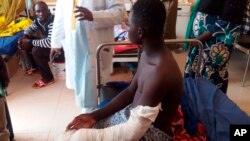West Africa’s Sahel region saw mounting violence and a rollback in free expression last year, rights group Amnesty International says in its latest annual report, released Tuesday.
Amnesty International says that for Mali, Burkina Faso and Niger — 2022 was an especially grim year. The countries saw an uptick in civilian killings compared to 2021, as they battle an ongoing jihadi insurgency in the region.
“We are talking about 9,000 civilians killed due to the conflict — and increase of 54% compared to 2021,” said Ousmane Diallo, Sahel researcher for Amnesty’s Dakar office.
He says governments in these three countries are increasingly disregarding human rights. One big thing that’s changed in the region over 2022: reports of the growing presence in some places of the Wagner Group, a private Russian mercenary company.
Mali and Burkina Faso have also seen coup d'états over the past two years.
“I think there is certainly a strong link between these military takeovers and some of the abuses of human rights… I specifically want to cite here freedom of expression and press freedom in Mali and Burkina Faso… that have been under strong attacks by these military governments,” he said.
Diallo gives the example of Malian journalist Malick Konate, who was forced into exile for reportedly shooting footage for French TV that showed Wagner’s presence in Mali.
“The situation of Malik Konate is not a unique one. Many other actors —whether journalists or human rights defenders of political actors — have been forced to exile due to these attacks against freedom of expression and press freedom,” he said.
Even Senegal, considered one of West Africa’s most successful democracies, has lost points, Diallo says, when it comes to civil liberties. It’s president, Macky Sall, is considering running for a third term — which the opposition asserts would be unconstitutional.
“The situation in Senegal has dramatically worsened over the last two years. We have seen a lot of abuses against freedom of peaceful assembly — whether the right to protest by the opposition, by civil society members, is often rejected by administrative Authorities due to risk of disturbing public order without giving any specifics about it. But also, freedom of expression and press freedom,” said Diallo.
Amnesty also criticizes forced deportations under agreements aimed to control migration — including Algeria’s expulsion of thousands of sub-Saharan African migrants to northern Niger in recent years. Reports say many are dumped into the desert with little food or water. Algeria denies such accusations, calling them “malicious.”







